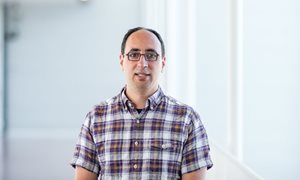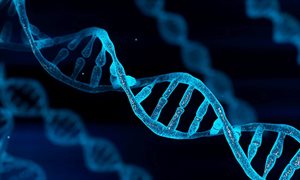
New mutations in DNA, which are not inherited from the father or mother but arise spontaneously before or during fertilization, can cause infertility in men. This is the conclusion of a research team from the Radboudumc and the University of Newcastle in a publication in Nature Communications. This breakthrough discovery in understanding the underlying cause of infertility offers hope for better treatment options.
Infertility occurs in about seven percent of men. At the expertise center for male infertility of the Radboud University Medical Center, scientists have been looking for causes of infertility for years. "Sometimes we find a cause for the absence of sperm, such as an infection or disturbed sperm production after cancer treatment," says Dr. Liliana Ramos, clinical embryologist and head of the fertility laboratory. "But in more than half of the cases the cause for infertility is unknown. In this group of patients, we looked for mutations in the infertile man's DNA that were not present in both his fertile parents. In this way we discovered that the male infertility is often caused by newly formed errors in his DNA, so-called de novo mutations. These errors have already arisen in the DNA of the egg or sperm cell of the man's parents, or just after fertilization."
Research design
The researchers led by Prof. Joris Veltman and Dr. Godfried van der Heijden studied the DNA from 185 infertile men and their parents. They identified 145 rare protein-changing errors in the DNA with a high probability to have a negative impact on male fertility. As many as 29 of these errors affect spermatogenesis - the process involved in sperm cell development and maturation - or other processes related to reproduction. For example, the RBM5 gene, in which multiple mutations have been identified. Previous research in mice has shown that this gene plays a role in male infertility.
Effects on offspring
Men who cannot naturally conceive due to such errors in their DNA, can be treated with assisted reproduction techniques such as in vitro fertilization (IVF) or intracytoplasmic sperm injection (ICSI) and can father their own genetic children. What does that mean for the fertility of their children? "It is important that we investigate the causes of infertility, so that we can better assess whether children of infertile couples are also at risk of infertility later in life," explains Dr. Manon Oud, who received her PhD on this research last year. "These new errors that we have discovered usually cause a dominant form of infertility, requiring only one mutated gene. As a result, the chance of passing on the error is fifty percent. This can lead to infertility, especially in sons."
Treatment options
The researchers hope that this new knowledge will shed more light on the cause and the best treatment options for infertile couples in the future. Researcher Dr. Roos Smits says: "Hopefully, our research will increase the percentage of men in whom the cause of infertility is known. In addition, doctors can better counsel and advise these couples on the best way to conceive, by suggesting the most appropriate medically-assisted procedure or, in cases where there is no suitable treatment, offering other alternatives."
Standard analysis in clinic
In follow-up studies, the research team plans to look further into the role of the newly identified errors in DNA and their impact on spermatogenesis and overall fertility in men. In addition, this year the Radboudumc will start a much more extensive diagnostic analysis of the DNA of all men who present with infertility at the reproductive unit. Ramos: "We intend to detect what is wrong in a much earlier stage during diagnosis. If you already know on the basis of genetics that no sperm can ever be produced, then you can decide to refrain from infertility treatment, which is very stressful for both the man and the woman. It means a lot to the couple and the practitioners if we know the cause of infertility."
Expertise Center
The male infertility expertise center of the Radboud University Medical Center is the largest center in the Netherlands in the field of male infertility, with the highest rates of successful pregnancies after an ICSI with surgically retrieved sperm (Society for Obstetrics and Gynecology). The expertise center for male infertility covers the entire chain of care, from research, diagnostics and treatment, up to counseling and follow-up. The reproductive center at Raboudumc (both clinic and the laboratory) was also the first in the Netherlands to receive an ESHRE-ART certificate (European certification) in the field of Good Clinical Practice for assisted reproduction.
More information
This research was published in Nature Communications: A de novo paradigm for male infertility. Oud MS, Smits RM, Smith HE, Mastrorosa FK, Holt GS, Houston BJ, de Vries PF, Alobaidi BKS, Batty LE, Ismail H, Greenwood J, Sheth H, Mikulasova A, Astuti GDN, Gilissen C, McEleny K, Turner H, Coxhead J, Cockell S, Braat DDM, Fleischer K, D'Hauwers KWM, Schaafsma E, GEMINI Consortium, Nagirnaja L, Conrad DF, Friedrich C, Kliesch S, Aston KI, Riera-Escamilla A, Krausz C, Gonzaga-Jauregui C, Santibanez-Koref M, Elliott DJ, Vissers LELM, Tüttelmann F, O'Bryan MK, Ramos L, Xavier MJ , van der Heijden GW, Veltman JA.
More information about the Center of Excellence for Male Infertility can be found here.
-
Want to know more about these subjects? Click on the buttons below for more news.
More information
Annemarie Eek

wetenschapsvoorlichter
Related news items

Dogma broken: sex differences in XLMTM mapped out Women also experience muscle symptoms due to genetic disorder X-linked MTM
6 October 2022For a long time, healthcare professionals thought that only men could suffer from XLMTM, a serious muscle disease that is inherited via the X chromosome. It now appears that women with this genetic defect are also prone to this disease.
go to page
Nael Nadif Kasri appointed professor of Medical Neuroscience for Neurodevelopmental Disorders
11 April 2022 Kasri creates brain organoids to study brain development, how genetic errors lead to disorders, and what drug or therapy can help. go to page


